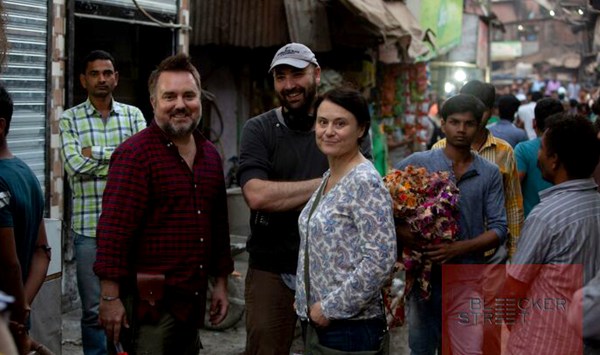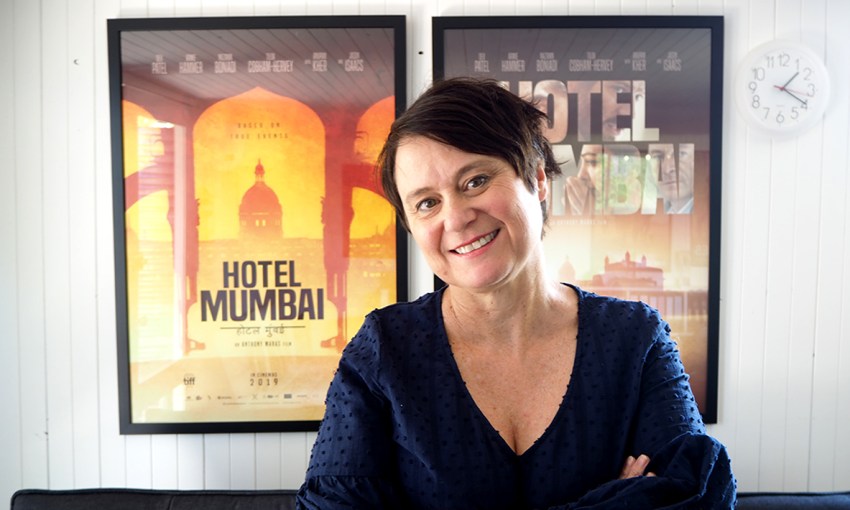South Australians love to whinge about the brain drain but Julie Ryan has made some of Australia's most ambitious and successful films since relocating from Melbourne to Adelaide.
How to make movies with the Adelaide-based producer of Hotel Mumbai and Red Dog
They’re the people who accept the “Award for Best Picture” at the Oscars, but what a film producer does is little understood outside of the movie business.
Adelaide film producer Julie Ryan says she’s stopped explaining her job in detail to people because “any more information and their eyes start to glaze over.”
Letti K-Ewing is the Writer in Residence at The Mill. This work was contributed through The Mill’s Writer in residence program.
Annual application for residencies open in June. See The Mill’s website for more details.
Indeed Julie Ryan was completely unknown to CityMag prior to our interview, and yet we were already huge fans of her work: Ten Canoes, Red Dog and – most recently – Hotel Mumbai.
Julie is a force within the Australian film industry. She has built a 20-plus-year career as a filmmaker based on knowing what works with Australian audiences and she’s proud to call Adelaide home.
In order to shed some light on what a film producer does and – hopefully – encourage other aspiring filmmakers, Julie agreed to sit down with CityMag and explain her career path and how to make movies with the best of them.
Film production in a nutshell
Film produces are on the “business side of making films,” says Julie. “We find the project, develop it with the writer, put a creative team together (director first, then cast), raise the finance, negotiate the deals with our stakeholders, and generally manage the project.
“We are ‘first on, last off’, oversee the creative vision, and are ultimately financially responsible for the project,” says Julie, leaving our eyes wide rather than glazed over.
Understand your audience first
“You have to know what the market wants and that differs,” says Julie. “Australian audiences are quite different to international ones.”
“In Australia it’s quite difficult to get a film up because it doesn’t come from one source of money… It’s my job to find a property, secure the rights, put a team together, and develop the story, which can take a long time. And then when it’s ready, we finance it…
“[We] go to Cannes every two years [as well as] Toronto and Melbourne. You have to know what the market wants and that differs.”
Julie says she had somewhat of a late start in filmmaking. “I didn’t get into the film industry until I turned thirty,” she says.

Julie Ryan on the set of Hotel Mumbai with director Anthony Maras (in the cap) and cinematographer Nick Matthews
Find a great mentor
Julie studied film theory at university and moved from Melbourne to Adelaide in 1996 to be a production secretary on Richard Flanagan’s The Sound of One Hand Clapping. Flanagan had originally asked Rolf de Heer to direct the film but Rolf declined and said he would produce the film instead. Rolf and Julie formed a working relationship on the set of The Sound of One Hand Clapping that kicked off a decade of collaboration between the pair.
“I evolved as my experience grew. I mean, I had business and admin skills… but Rolf taught me how films were made and that was a great gift. So it was a long film school for me actually,” Julie says, laughing.
Rolf’s 2002 film, The Tracker, was one of Julie’s first producer credits on a feature. The Tracker earned Julie and Rolf an Inside Film Award for Best Feature Film, while actor David Gulpilil picked up numerous accolades for Best Actor. Julie and Rolf went on to make Ten Canoes together – the first feature film in an Aboriginal Australian language – with director Peter Djigirr in 2006. The film garnered international acclaim and won the Special Jury Prize at Cannes Film Festival in 2006.
Think global, make local
After the Cannes prize, in 2007, Julie established Cyan Films – her own production company which she operates out of Adelaide.
“I love Adelaide. I’m not a big city person… and it’s a great little city, so it’s a real lifestyle choice,” Julie says of her decision to remain based in Adelaide.
While filming Red Dog in 2011, Julie’s influence on the film’s locations reveals the producer’s South Australian bias.
“You’re often presented with a script that you can’t afford to finance,” says Julie about the revenue raising aspect of her job, “so you’ve got to come up with ingenious ways of working out how to make the film”.
Julie’s ingenuity is no better exemplified than in her and her co-producer’s approach to making Hotel Mumbai. Funded in conjunction with the South Australian Film Corporation and directed by Anthony Maras (himself a South Australian), Hotel Mumbai is Julie’s latest film to hit cinemas.
Many interior shots of The Taj Mahal Palace Hotel were filmed in Adelaide’s Glenside building. Julie says production designer Steven Jones-Evans took on the monumental job of making Adelaide’s Glenside building look like the grand setting seen in the film.
Adding to the complexity of this particular film, Hotel Mumbai was to be Anthony Maras’ feature film debut. Julie says it’s difficult for first-time feature directors to get ambitious, action-packed scripts like Hotel Mumbai off the ground. But Julie says her confidence in backing Anthony was based on her experience working with the director on his thematically similar short film, The Palace.
“Great advice to anyone who does want to make a feature is to do a short film that is in similar tone… It’s hard to finance first time feature directors. It’s really hard unless they’ve got a short that has won awards and it’s very similar to their feature,” she says.
The next film
Julie’s next film, H is For Happiness is based on children’s book My Life As an Alphabet and is set for worldwide release in 2020.
The “particularly female-skewed” family film will premiere at Melbourne Film Festival and promises to weave all the comedy and tragedy from the cherished book into the adaptation. Julie has hopes to pick up another young adult book for adaptation with H is For Happiness director John Sheedy.
Julie cannot tell us any more information about this next project, but with her career path to-date, we’re sure it’ll be a box office smash.




